Previously… The Crimson Horizon threaded a liar’s reef by a red-blinking lighthouse and left the Spanish frigate Santa Lucía hard aground. In Silas Blackthorne’s cabin, an iron chest opened to reveal a star-compass—a brass disc whose mercury channels pointed not north, but when. It named a place: Isla de Sombras — Island of Shadows.
The Island That Hums
Before dawn, the sea went velvet—no chop, no glimmer—just a wide black cloth pulled tight. The Crimson Horizon slid across it as if the ocean had forgotten it could refuse. The air tasted like old coins. Finn O’Malley felt the lines in his palm wake and turn, drawing a steady arrow toward the dark bulk ahead.
“Helm, one point to starboard,” Silas said without raising his voice. His glass eye drank starlight; the other stayed on the not-quite-there line Finn’s hand insisted upon.
“Feels like sailing into a mouth,” Bosun Briggs muttered, and spat to prove he still could.
The island rose as a ring of basalt spires, each high as a mast and slick as seal skin. Between them: arches and windows where no stone should have stayed. The surf ran backward against some of the teeth, licking the rock and slipping down like an unmade decision. Here and there, ribs of ships leaned out of the water like the cages of huge fish. Some were new; some wore coral as jewelry; some had not been built in anyone’s memory.
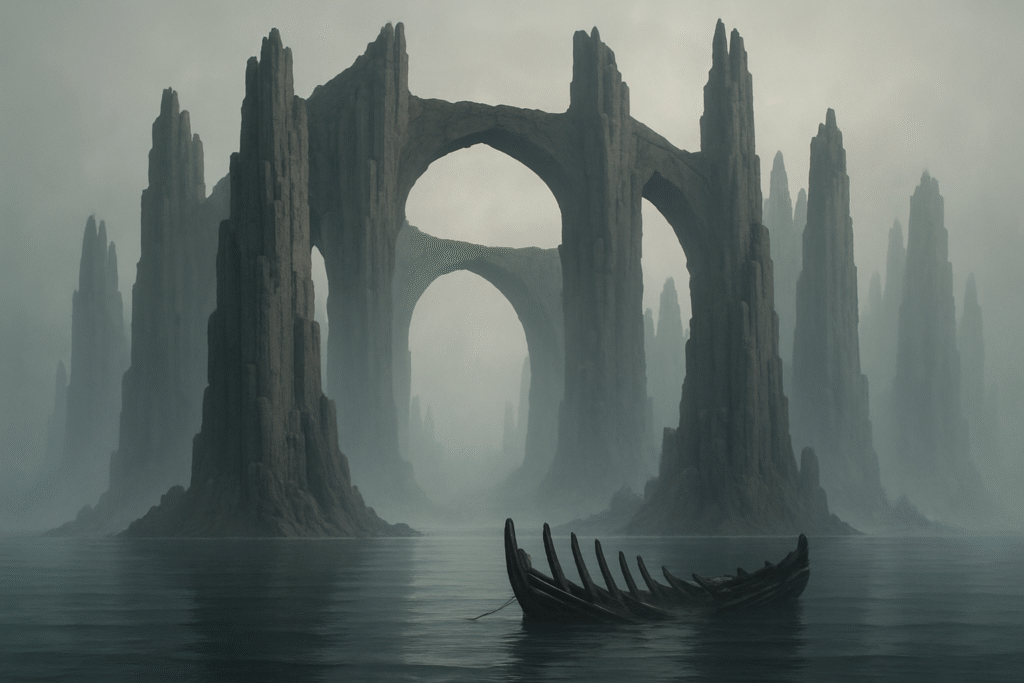
A hum rolled out from the ring, low and even, as if the island were a tuning fork held to a giant’s ear. It settled into the bones of the ship and stayed there.
They hove to outside the spires, sails breathing, lines chattering. The red blink they’d followed at the lighthouse was gone. In its place, deep in one black window of the rock, a blue lantern swayed.
Finn’s breath caught. “Her,” he said, before he could think to keep the dream to himself.
Silas turned his head a degree. “Her?”
“The woman with the blue lantern,” Finn said, and flushed because the words sounded like a boy’s fear. “She said—she said to bring back what they stole.”
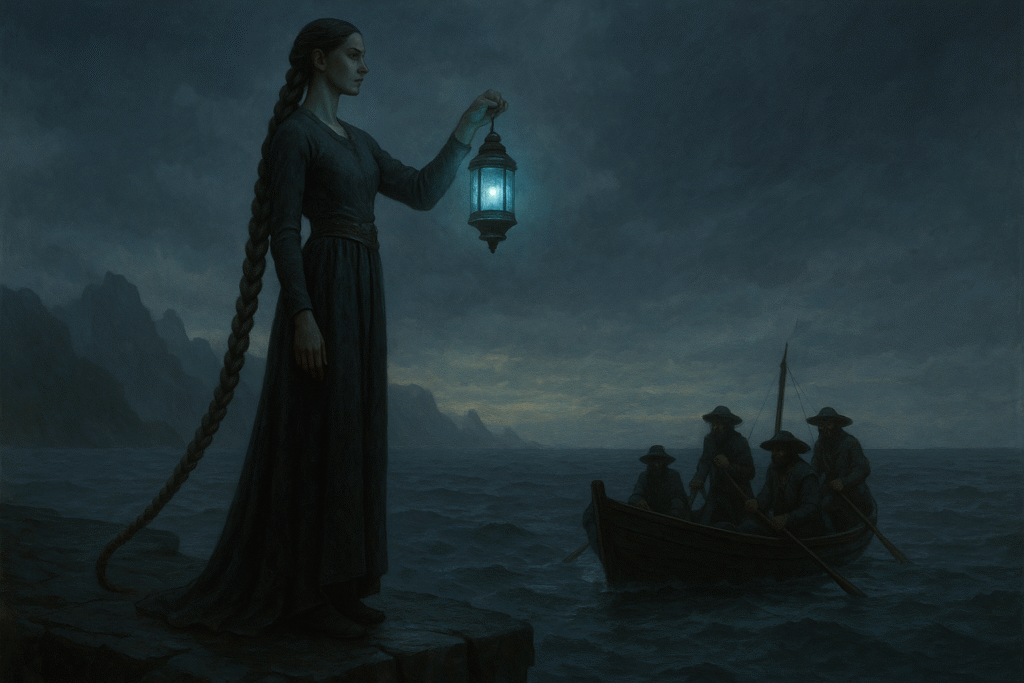
Briggs made the sign of the cross, then pretended he’d just scratched his beard. Quartermaster Mireya, who preferred numbers to saints, tightened the copper wire on her braid.
“Drop the longboat,” Silas said. “Briggs, Mireya, Finn. Mr. Hayes, you have the ship; keep our teeth off theirs.”
“Aye,” Hayes said, but with the care you use for a barrel of powder you’re not sure is dry.
They rowed into the mouth. The hum grew louder. It wasn’t in the air; it was in Finn’s teeth. He tasted slate and thunder and something like winter apples kept too long in a cool room.
Inside the ring, the sea smoothed again. The blue lantern bobbed on a ledge of stone slick as tongue. When the longboat’s keel kissed rock, the lantern rose, and the woman holding it stepped into the boat as if it were a ballroom floor she owned.
She was taller than Finn by a head and a half, her hair braided in coils like rope never used to tie anything mortal. Her eyes were a color the sky keeps when it means to storm and doesn’t. When she smiled, it looked like happenstance, not kindness.
“Little compass,” she said to Finn, the way the dream had shaped it. “We make our acquaintance in better weather.”
Mireya set a hand on Finn’s shoulder, a quiet anchor. Briggs did not reach for his knife but only because he remembered his manners too late.
Silas set the longboat’s hook and tipped his hat as if to a governor. “Lady,” he said. “We bring coin for the toll.”
“You always do,” she said, and her lantern burned a little brighter. “You bring coin and want credit. You bring credit and want time.” She turned the light; Finn felt it like a hand on his cheek, warm and clinical. “You bring a boy marked to read a clock the sea forgot to show men.”
“The star-compass names a passage,” Silas said. “We would take it.”
“You would,” the woman agreed. “You will if you pay the debt you already owe.”
Silas’s jaw made the shape of a smile and did not finish the work. “The eye,” he said. He touched the puckered place where the glass glittered. “I paid.”
“You paid an earnest,” she said. “You promised the rest when you came to my door. You brought my key.” She tipped the lantern toward the longboat’s bottom boards, and Finn realized the iron chest was there, heavy enough that the boat rode lower than his legs had told him.
Briggs’s head whipped toward Silas. “You brought what?”
“Quiet,” Mireya said, which was a smaller word for not now, not here.
The woman with the lantern lifted her chin toward the spires. “Once a year the tide goes backward and the time with it. Sailors call it superstition and I let them.” She lowered the lantern so its light ran like water over Silas’s hand. “Your debt is not in coin. It is in years.”
“How many?” Silas asked, as if asking the price of oranges at market.
“Enough to square what you took when you cheated a storm,” she said. “Enough to pay for that reef that bit your pursuer instead of you. Enough to open the gate and not let it close on your stern.”
Briggs swore without using words anyone would write down. Mireya’s fingers dug into Finn’s shoulder, as if to remind both of them where they were.
Silas considered. He had the expression he wore when a broadside needed timing you couldn’t put on paper. “All at once?” he asked. “Or tithed?”
“Tithes are for parishes with poor boxes,” the woman said. “I am a counter, not a beggar. The sum is due on delivery.”
Silas exhaled. He took the crystal key from his coat and set it on his palm. “If I pay,” he said, “the passage is ours. Mine to steer. His”—he nodded at Finn—“to read. My crew, under my protection.”
The woman tipped her lantern, which might have been a nod, if old things nod. “If you pay, your ship will not find a rock inside my ring unless you mean to marry it.”
“And if I don’t?”
“Then you will learn,” she said pleasantly, “what it costs to be clever in the wrong room.”
Silas held up his hand. “Then count.”
He drew a blade and cut the lifeline in his palm where the serpent’s thread had kissed him before. Blood beaded, black in the blue light, and fell on the brass disc of the star-compass as he set it on his knee. The mercury shuddered. The little pointers quivered like fretful birds and then went still.
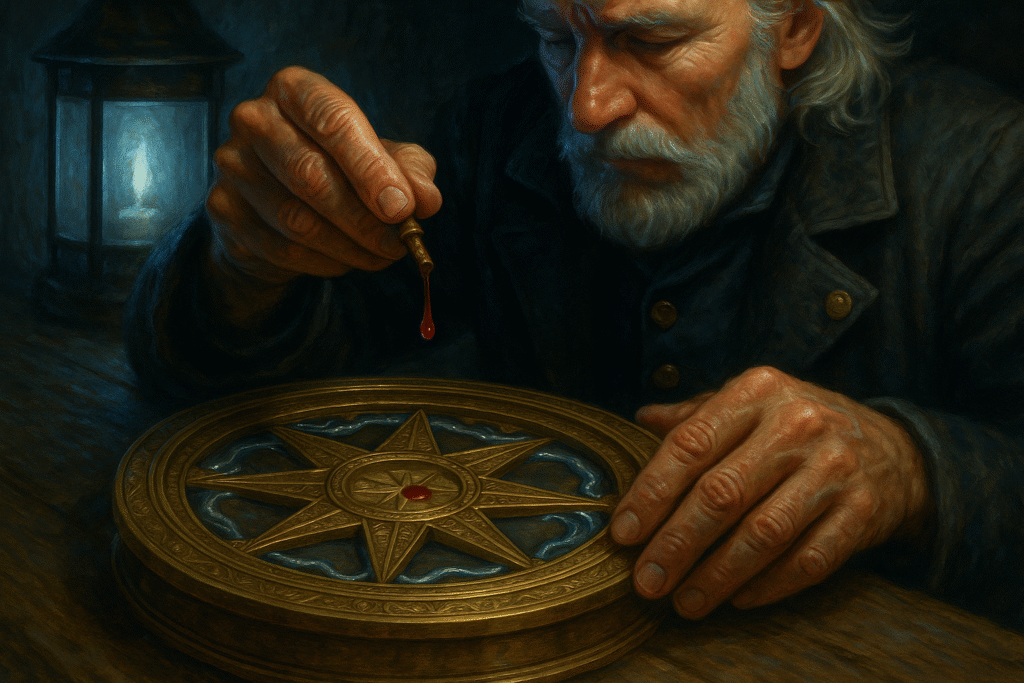
Something left him.
Finn saw it as clearly as fog at dawn: a weight gone out of Silas—his posture loose for a heart-beat, the lines at the corners of his mouth deepening, a white whisper at the temple that had not been there. It wasn’t theatrical. It was arithmetic performed on a life.
“Two years,” the woman said, not cruel and not kind. “Try again.”
Silas cut again, smaller. The mercury drank it; the pointers clinked. Another sigh out of him, bone-deep. Another pale thread in his hair.
“Four,” she said. “Once more.”
“Stop,” Briggs said, and his voice cracked. “You’ll pay yourself to a stump.”
Silas didn’t stop. He pressed his hand again to the disc. His breath went thin. Finn felt the world adjust itself around the lack like rigging tuned. The blue lantern brightened, just a shade.
“Six,” she said. She cocked her head. “You never were good at small sums.”
Silas closed his hand. His mouth had blood in it where he’d bitten it without noticing. “The gate,” he said.
The woman looked at Finn. “You will steer him exactly,” she said. “You will not lend him bravery he doesn’t own.”
Finn thought of the Santa Lucía groaning on the reef and didn’t ask if that was bravery. He nodded. The lines in his palm brightened, tiny and sure.
“Then your passage,” the woman said, and touched her lantern to the black water.
The hum rose. The basalt teeth unbit themselves. Between two spires, the sea made a line where it had no room and turned as flat as a blade. It did not glow. It did not foam. It simply became a door.
“Go,” she said.
They went.
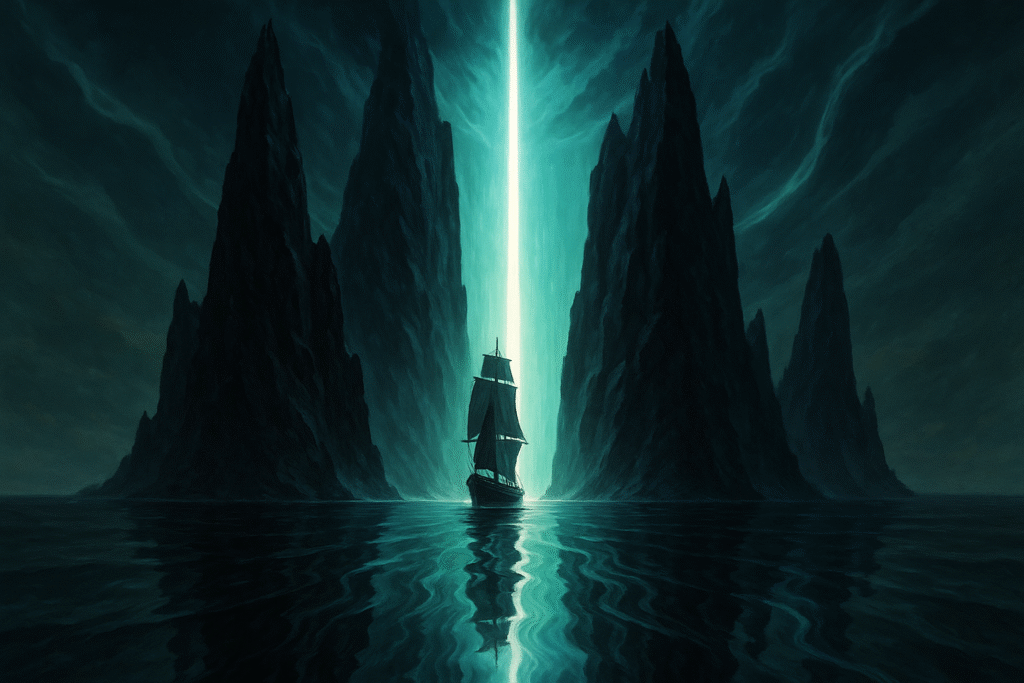
Channels That Don’t Care About You
The Crimson Horizon took the gate like a whisper takes a secret. The blue light fell behind; the stars ahead slid on a rail. Wind forgot to exist; then remembered in a single clean breath that took them broadside and held.
“Read me,” Silas said, and Finn read because the lines in his hand told him where stone wore water into corridors that time used when it didn’t want to be seen. He called bearings that were not numbers and Hayes made them into motion. The star-compass hummed in its gimbals on the binnacle, mercury flowing like a thought.
On either side, the world stacked in wrong orders: a squall line walking backward; a rainbow at midnight; snow falling from a blue sky and not melting. A ship passed on their larboard beam, sails furled, crew staring; it was the Crimson Horizon, but older or younger, Finn couldn’t say, and its figurehead had a different scar. Mireya didn’t look. Briggs looked and swore softly in three languages, none of which helped.
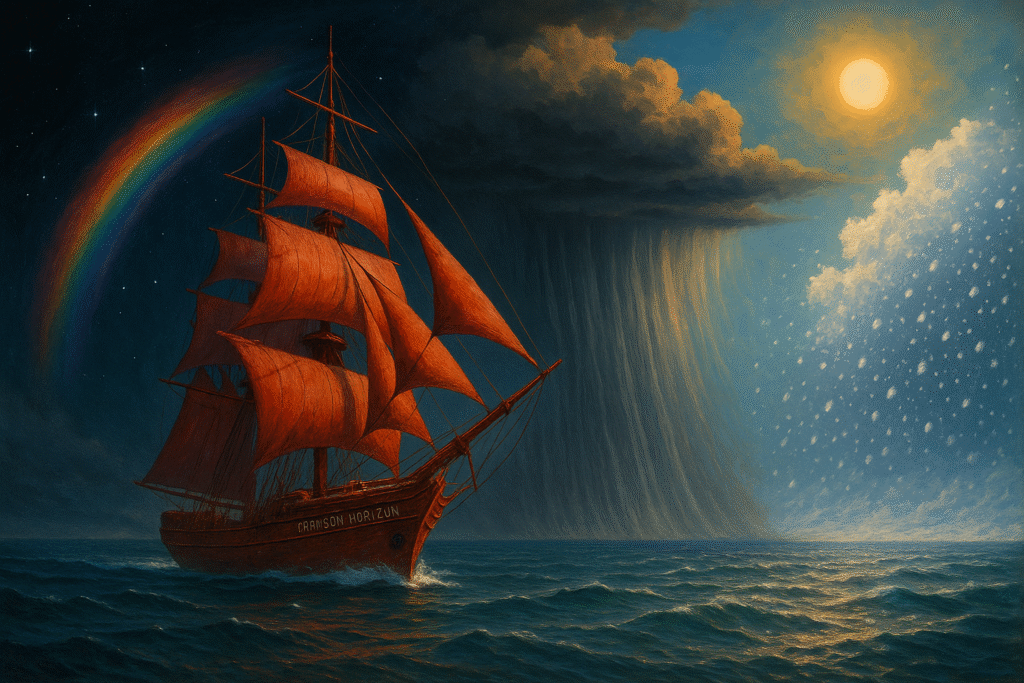
“Hold us tight to his hand,” Silas said, and Hayes did, knuckles white and sure.
Halfway through the channel that wasn’t a place, trouble chose its hour.
The gunner, Crake, whose mouth had always been too ready with opinions, came up out of the companionway with three men at his back. Their eyes had the glitter men get when fear and greed have decided to split the bill.
“There’s no need,” Crake said, easy, as if discussing fresh water. “To pay years we can take them. The boy is marked. The chest wants him. It threads itself to him. He owes nothing yet, so he’s a clean ledger. We give the island his years and keep the captain’s.”
He could have said other words. He chose the ones that made knives seem like solutions.
Briggs moved before the thoughts had finished arriving in the mutineers’ heads. He caught Crake by the wrist and set his arm against the rail hard enough to remind bones they were not the boss of him. Mireya’s pistol was already at another man’s belly; she did not shake.
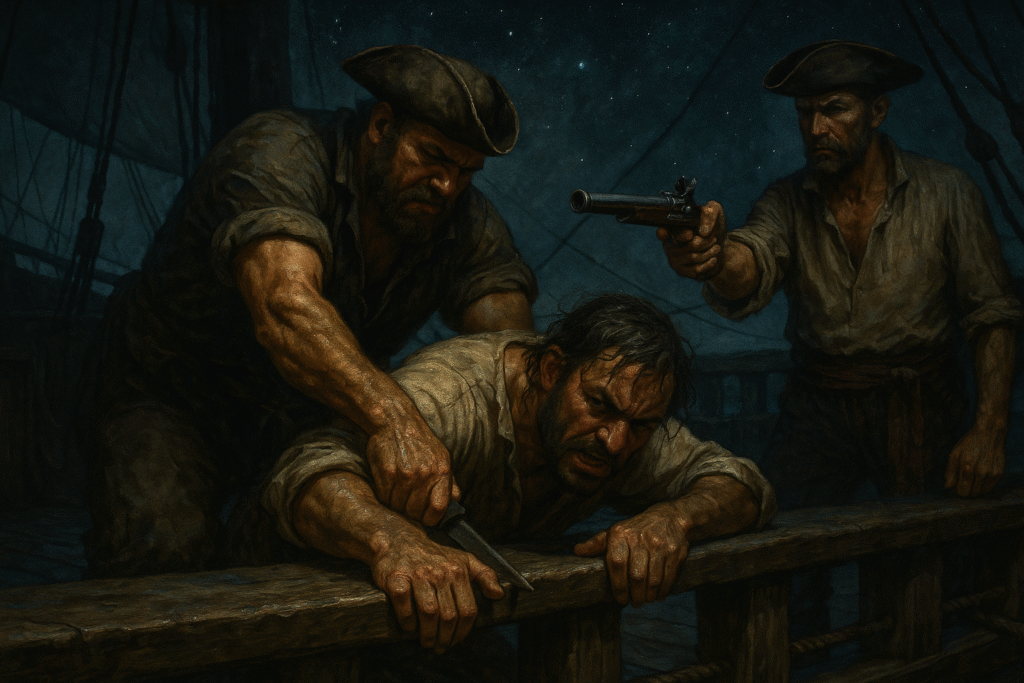
“Don’t,” she said, and because it was Mireya it sounded like arithmetic, not drama.
Finn didn’t step back. He should have. He didn’t.
“It’s my hand that reads,” he said, and his voice didn’t crack the way his ribs wanted to. “You cut it and we’re blind.”
“Blind is better than bled,” Crake said through teeth.
“Blind gets you married to rock,” Hayes said, very mild, and adjusted the wheel one degree toward a line Finn hadn’t spoken yet. “Married is forever.”
Silas didn’t raise his pistol. He didn’t speak to Crake at all. He spoke past him to the crew watching from the lines and the waist, the ones who were deciding which way their fear would aim.
“You sail with me because I keep reckonings,” he said. “I keep them when it’s easy and I keep them when it rots me. I paid six years and I’ll pay six more before I pay with a boy I promised the sea to keep.”
He let the words sit a breath. He didn’t look to see where they landed. He set his good hand—older by an evening—on the wheel for one measure, then took it away, because he trusted Hayes.
“Bosun,” he said.
Briggs looked at Crake as if seeing the future of the man’s choices and not liking any of it. “Below,” he said, and turned Crake with the same gentleness a mill uses to turn grain into something else.
Crake didn’t fight. Not because he couldn’t. Because the crew’s fear had chosen its side.
The channel narrowed. The star-compass clicked like a beetle thinking. Finn’s palm burned. Ahead, the world thickened the way air does before lightning. The smell of winter apples grew sharp.
“The lock,” Mireya said. “We’re at it.”
“Open,” Silas said, and Finn didn’t know whether he meant the chest or the sea.
The mercury ran to its edges and left the brass bare save for one hairline seam none of them had noticed. It glowed, not blue, not red, but the white of bone under skin. The seam spread, and the sea in front of them broke the way light breaks in a lens.
There was a harbor inside that break.
Not a harbor like Havana or Tortuga. This one was made of time laid flat. Ships lay at anchor in it, not on water but on their own moments—Spanish, English, nameless—sails hanging in winds that belonged to different days. Some were intact. Some were frozen at the instant of burning, flame a sculpture that had never learned heat. Along the far curve, a city slept in basalt, no lights, no smoke, just arches upon arches where gulls should have sat and did not.
Finn’s skin knew the name before his tongue did. “Sombras,” he whispered.
The Crimson Horizon nosed in like a thief who had paid too much to be called one. Lines went slack. Anchors that were not iron took them. The hum dropped to a whisper.
“Find what they stole,” the woman with the lantern had said.
Mireya looked at Silas. “What did they steal from you, Captain?”
Silas didn’t answer until the longboat scraped weird stone again and his boots were on a dock that had never touched a tide. When he spoke, his voice made more truth than sound.
“A night,” he said. “On a coast with a name I won’t give you because if I do, you’ll carry it. I bargained a storm away and the storm didn’t like the bargain. It came back as sickness and took—” He stopped and smiled that not-smile. “It took something I wanted back. I thought the world might have a counter where I could set my coin.”
Briggs looked at him like a man who had thought his captain was made of rope and found, after all, some flesh.
“And the rest of us?” he asked, but not like a challenge.
Silas looked at Finn’s hand. “You,” he said, “will keep me from paying more than we can carry.”
Finn nodded, though his mouth was full of sand.
They walked into the city that had no gulls.
The archways led to a plaza with a dial set in the floor—concentric rings of shell and jet, pins of bone, channels of mercury like the compass’s big brother sunk into rock. At its heart was a place where a key would seat.
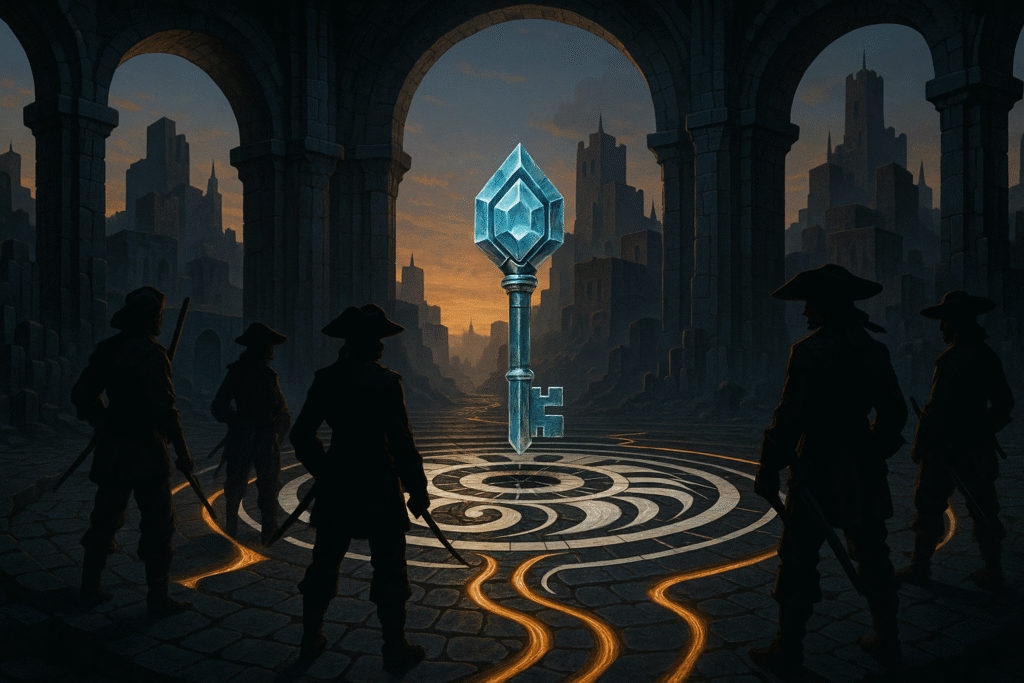
Silas set the crystal tooth in it. It turned, as if it remembered his hand.
Above them, the sky moved one notch and stopped—noon turned early afternoon in a blink. A sound rose in the stone beneath their boots: ticking that was not any clock men build.
“Choose,” said a voice that was not the blue-lantern woman’s and not anyone’s, just the square speaking. “What you take. What you leave.”
Silas closed his eye. Opened it. “Take the night I paid the storm,” he said. “Leave—” He licked a tooth where blood had dried. “Leave six years.”
“That is not the cost,” the voice said, the way a scale says things when you put the wrong weight on it. “Balance the book.”
Before Silas could answer, Crake’s voice came from behind them, raw and eager, his wrists still chafed. “Take his years,” he shouted, and lunged toward Finn.
He didn’t reach him.
Briggs did, interposing a body that had learned the ship’s roll too long to misplace its center. Crake’s knife skittered; Mireya’s boot found its point and pinned it exactly. Hayes’s hand closed on Crake’s collar the way fog closes on rigging: everywhere.
Silas didn’t look away from the dial. He put both hands on the rim of it and bled because the brass wanted it.
“Balance,” he said. “Take the years I stole in every narrow passage where another ship went to a rock I meant for me. Take what we owed the Santa Lucía. Take the storm’s due. Leave the boy.”
The plaza listened. The ticking counted. The mercury slid and made a word Finn could not see and knew anyway.
“Paid,” the stone said.
Something gave back.
It came fast and clean as a taut line cut. It hit Silas like a wave that had meant to drown and changed its mind at the last instant. He staggered; Briggs’s hand was there; Mireya’s shoulder set him upright. Finn’s palm burned and then cooled, the lines re-inking from a fever to a fact.
On the far edge of the plaza, a door that was not a door opened. Behind it: a room made of weather—sheets of rain that never fell, a smell of her he would not name, a laugh the air had kept. Silas walked in alone.
He came back with nothing in his hands.
He did not bring a person. He did not bring a trinket. He brought time shaved off a grief—edges rounded, a wound that would never fully close sanded to where a man could steer with it without bleeding on the wheel.
“Captain?” Briggs asked, careful.
Silas put the crystal key in Finn’s palm and closed the boy’s fingers around it. “If I forget why we pay,” he said, “you remind me.”
The humming changed key.
“Go,” the plaza said, not cruel and not kind.
They went.
As the Crimson Horizon swung out, a shadow moved between two impossible spires—the shape of a ship they knew by the stubborn rake of her masts. The Santa Lucía slid free of a rock she had been married to an hour ago or a year hence and turned her black-and-gold nose toward the same gate.
“Seems,” Mireya said, dry as a salt biscuit, “we’re not the only clever men and women shopping for time.”
Silas’s mouth made a line Finn would learn to fear and trust in equal parts. “Then we’ll learn to outrace a clock.”
The blue lantern burned once in the corner of Finn’s eye, a blink behind the lid. The channels began to close.
“Hold fast,” Silas said.
The gate took them, and the shadows followed.
—To be continued—
